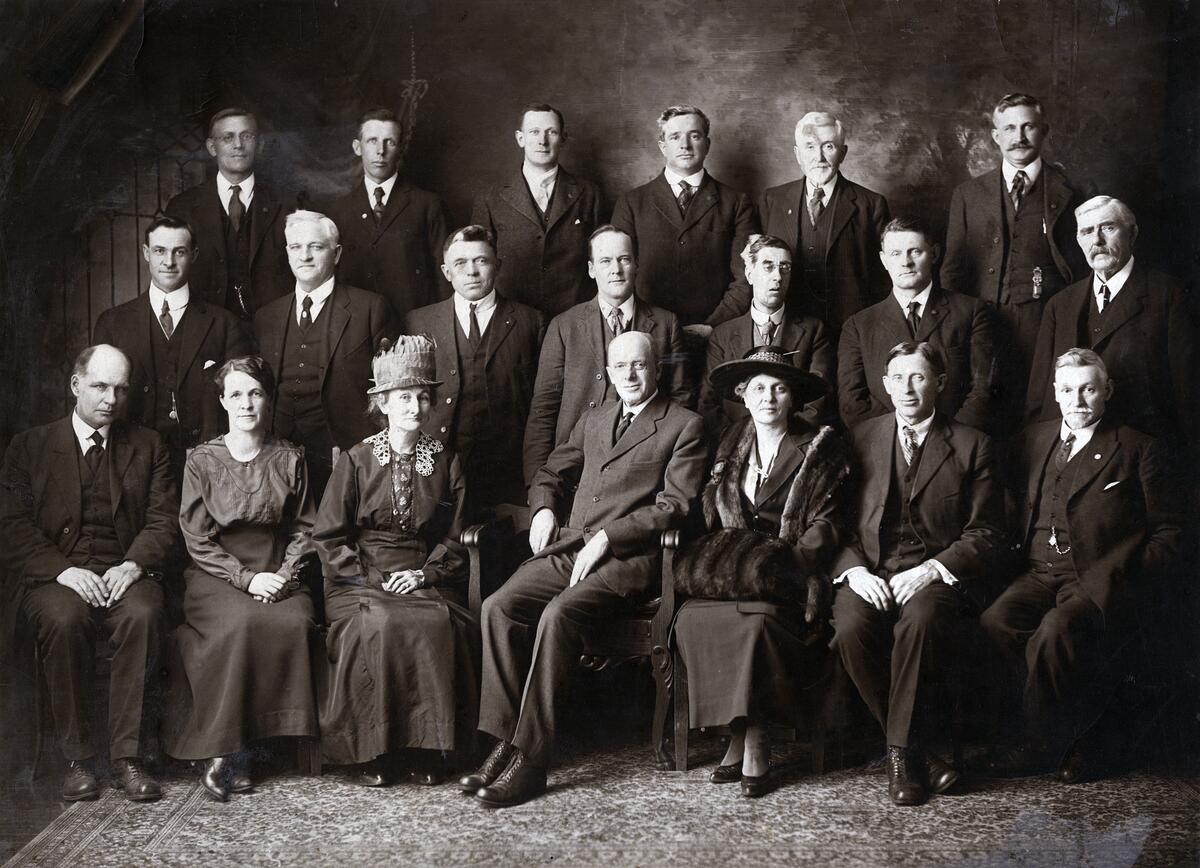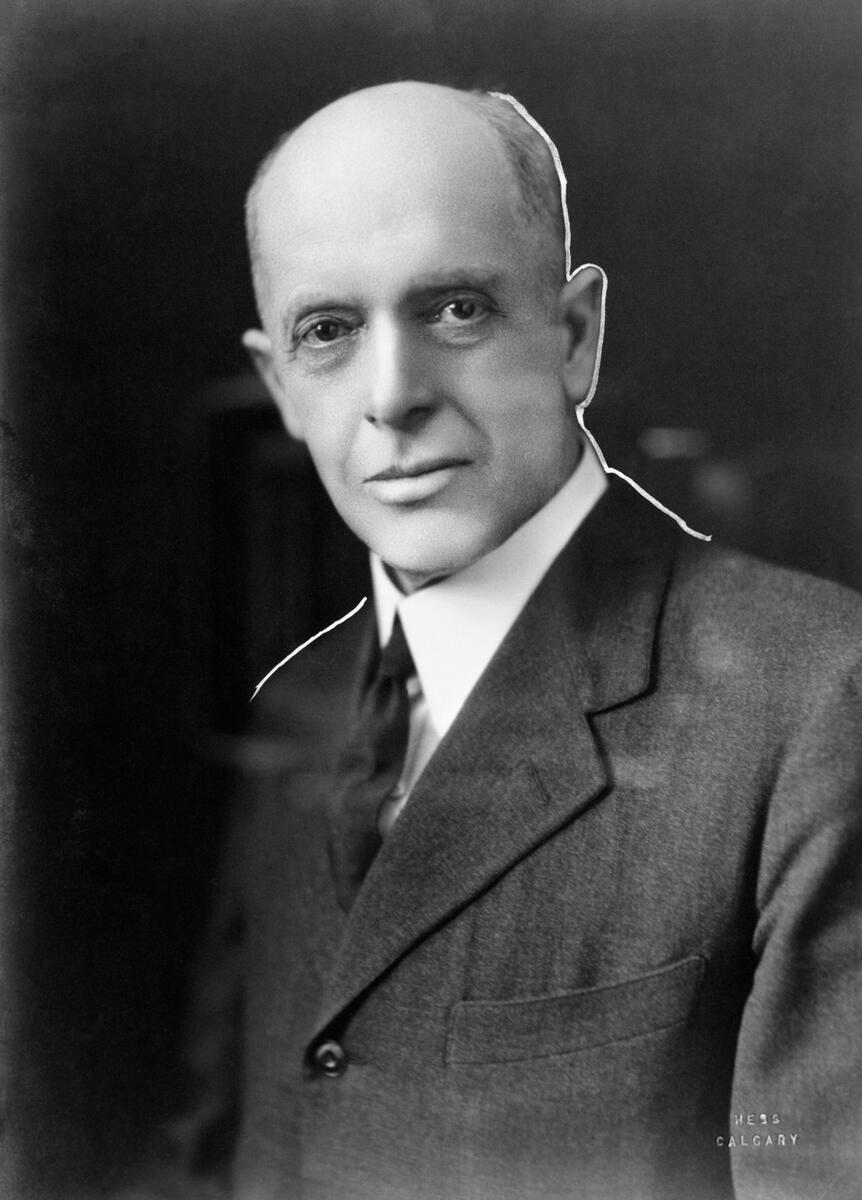|
Herbert Greenfield
Herbert W. Greenfield (November 25, 1869 – August 23, 1949) was a Canadian politician and farmer who served as the fourth premier of Alberta from 1921 until 1925. Born in Winchester, Hampshire, in England, he immigrated to Canada in his late twenties, settling first in Ontario and then in Alberta, where he farmed. He soon became involved in the United Farmers of Alberta (UFA), a farmers' lobby organization that was in the process of becoming a political party, and was elected as the organization's vice president. Greenfield did not run in the 1921 provincial election, the first provincial general election in which the UFA fielded candidates, but when the UFA won a majority in the Legislature in that election he was chosen by the UFA caucus to serve as Premier. Like most of the UFA caucus, Greenfield had no experience in government and he struggled in the position. He relied extensively on his Attorney General, John E. Brownlee, for counsel on policy and strategy. He was unab ... [...More Info...] [...Related Items...] OR: [Wikipedia] [Google] [Baidu] |
The Honourable
''The Honourable'' (British English) or ''The Honorable'' (American English; see spelling differences) (abbreviation: ''Hon.'', ''Hon'ble'', or variations) is an honorific style that is used as a prefix before the names or titles of certain people, usually with official governmental or diplomatic positions. Use by governments International diplomacy In international diplomatic relations, representatives of foreign states are often styled as ''The Honourable''. Deputy chiefs of mission, , consuls-general and consuls are always given the style. All heads of consular posts, whether they are honorary or career postholders, are accorded the style according to the State Department of the United States. However, the style ''Excellency'' instead of ''The Honourable'' is used for ambassadors and high commissioners. Africa The Congo In the Democratic Republic of the Congo, the prefix 'Honourable' or 'Hon.' is used for members of both chambers of the Parliament of the Democratic Repu ... [...More Info...] [...Related Items...] OR: [Wikipedia] [Google] [Baidu] |
Farmer
A farmer is a person engaged in agriculture, raising living organisms for food or raw materials. The term usually applies to people who do some combination of raising field crops, orchards, vineyards, poultry, or other livestock. A farmer might own the farm land or might work as a laborer on land owned by others. In most developed economies, a "farmer" is usually a farm owner (landowner), while employees of the farm are known as ''farm workers'' (or farmhands). However, in other older definitions a farmer was a person who promotes or improves the growth of plants, land or crops or raises animals (as livestock or fish) by labor and attention. Over half a billion farmers are smallholders, most of whom are in developing countries, and who economically support almost two billion people. Globally, women constitute more than 40% of agricultural employees. History Farming dates back as far as the Neolithic, being one of the defining characteristics of that era. By the Bronze Age, th ... [...More Info...] [...Related Items...] OR: [Wikipedia] [Google] [Baidu] |
Weston, Toronto
Weston is a neighbourhood and former village in Toronto, Toronto, Ontario, Canada. The neighbourhood is situated in the northwest of the city, south of Ontario Highway 401, Highway 401, east of the Humber River (Ontario), Humber River, north of Eglinton Avenue, and west of Jane Street. Weston Road just north of Lawrence Avenue is the commercial core of Weston, with many small businesses and services. Weston was incorporated as a village in the 19th century and was absorbed into the York, Toronto, Borough of York in the late 1960s. York itself was amalgamated into Toronto in 1998. Description Weston's building stock consists mostly of Victorian homes east of the railway with apartment and condominium towers on Weston Road overlooking the Humber River valley. Weston's main shopping district is located on Weston Road between Church Street in the north and Wilby Crescent (just south of Lawrence Avenue) in the south. Most buildings in this area reflect early-mid-20th century Ontario to ... [...More Info...] [...Related Items...] OR: [Wikipedia] [Google] [Baidu] |
Sarnia
Sarnia is a city in Lambton County, Ontario, Canada. It had a 2021 population of 72,047, and is the largest city on Lake Huron. Sarnia is located on the eastern bank of the junction between the Upper and Lower Great Lakes where Lake Huron flows into the St. Clair River in the Southwestern Ontario region, which forms the Canada–United States border, directly across from Port Huron, Michigan. The site's natural harbour first attracted the French explorer La Salle. He named the site "The Rapids" on 23 August 1679, when he had horses and men pull his 45-ton barque ''Le Griffon'' north against the nearly four-knot current of the St. Clair River. This was the first time that a vessel other than a canoe or other oar-powered vessel had sailed into Lake Huron, and La Salle's voyage was germinal in the development of commercial shipping on the Great Lakes. Located in the natural harbour, the Sarnia port remains an important centre for lake freighters and oceangoing ships carrying ... [...More Info...] [...Related Items...] OR: [Wikipedia] [Google] [Baidu] |
Dalston
Dalston () is an area of East London, in the London Borough of Hackney. It is northeast of Charing Cross. Dalston began as a hamlet on either side of Dalston Lane, and as the area urbanised the term also came to apply to surrounding areas including Kingsland and Shacklewell, all three of which being part of the Ancient Parish of Hackney. The area has experienced a high degree of gentrification in recent years, a process accelerated by the East London line extension, now part of London Overground, and the reopening of Dalston Junction railway station, part of London's successful bid to host the 2012 Olympics. Bounds Dalston has never been an administrative unit, and partly for this reason the boundaries are not formally defined. There are generally understood boundaries in the south and west, but less clarity to the north and east. There is an electoral ward of the same name which covers a part of the northwest of Dalston. Dalston's boundaries (taking in Kingsland and Shac ... [...More Info...] [...Related Items...] OR: [Wikipedia] [Google] [Baidu] |
Irene Parlby
Mary Irene Parlby ( Marryat; 9 January 186812 July 1965) was a Canadian women's farm leader, activist and politician. She served as Minister without portfolio in the Cabinet of Alberta from 1921 to 1935, working to implement social reforms that helped farm women and children. As a member of the Famous Five, she was one of five women who took the Persons Case first to the Supreme Court of Canada, and then to the British Judicial Committee of the Privy Council for the right of women to serve in the Senate of Canada. From 1930 to 1934, she was one of three Canadian representatives at the League of Nations in Geneva, Switzerland. Parlby's accomplishments have garnered her many honours, both before and after her death. In 1935, the University of Alberta granted her an honorary Doctorate of Laws, making her the first woman in its history to receive such a distinction. In 1966, a year after her death, she was named a Person of National Historic Significance, and in 2009, the Sen ... [...More Info...] [...Related Items...] OR: [Wikipedia] [Google] [Baidu] |
Alberta Wheat Pool
The Alberta Wheat Pool was the first of Canada's wheat farmer co-operatives in 1923. History Early years In 1923, the United Farmers of Alberta met with then Attorney General John Edward Brownlee to consider setting up a Wheat Pool just in Alberta. On the advice of Aaron Sapiro, a California lawyer they created a non-share, non-profit organization responsible solely for selling wheat for the best advantage. It was set up as a one-man, one-vote organization, with a 5-year contract required to deliver 100% of his commercial wheat to the Pool. United Grain Growers grain company and the Alberta Pacific Elevator company agreed to accept Pool deliveries in their facilities. Other elevator owners quickly agreed to accept Pool wheat when they realized the |
Prohibition
Prohibition is the act or practice of forbidding something by law; more particularly the term refers to the banning of the manufacture, storage (whether in barrels or in bottles), transportation, sale, possession, and consumption of alcoholic beverages. The word is also used to refer to a period of time during which such bans are enforced. History Some kind of limitation on the trade in alcohol can be seen in the Code of Hammurabi (c. 1772 BCE) specifically banning the selling of beer for money. It could only be bartered for barley: "If a beer seller do not receive barley as the price for beer, but if she receive money or make the beer a measure smaller than the barley measure received, they shall throw her into the water." In the early twentieth century, much of the impetus for the prohibition movement in the Nordic countries and North America came from moralistic convictions of pietistic Protestants. Prohibition movements in the West coincided with the advent of women's su ... [...More Info...] [...Related Items...] OR: [Wikipedia] [Google] [Baidu] |
Party Discipline
Party discipline is a system of political norms, rules and subsequent respective consequences for deviance that are designed to ensure the relative cohesion of members of the respective party group. In political parties specifically (often referred to as the caucus or parliamentary parties), the essential purpose of party discipline is to get all its parliamentary members to maintain the party line and vote in support of policies agreed to by a majority of the parliamentary members (or of the party leadership). Typology In order to maintain party discipline, given political parties usually appoint a party whip whose primary task it is to maintain party discipline and to ensure the given party members support the party on the floor of the legislature. In liberal democracies, party discipline commonly refers to the control that party leaders have over their caucus members in the legislature. Party discipline is important for all systems of government that allow parties to hold p ... [...More Info...] [...Related Items...] OR: [Wikipedia] [Google] [Baidu] |
Caucus
A caucus is a meeting of supporters or members of a specific political party or movement. The exact definition varies between different countries and political cultures. The term originated in the United States, where it can refer to a meeting of members of a political party to nominate candidates, plan policy, etc., in the United States Congress, or other similar representative organs of government. It has spread to certain Commonwealth countries, including Australia, Canada, New Zealand, and South Africa, where it generally refers to a regular meeting of all members of Parliament (MPs) who belong to a parliamentary party: in such a context, a party caucus can be quite powerful, as it has the ability to elect or dismiss the party's parliamentary leader. The term was used historically in the United Kingdom (UK) to refer to the Liberal Party's internal system of management and control. Etymology The word ''caucus'' first came into use in the British colonies of North America, ... [...More Info...] [...Related Items...] OR: [Wikipedia] [Google] [Baidu] |
1921 Alberta General Election
The 1921 Alberta general election was held on July 18, 1921, to elect members to the 5th Alberta Legislative Assembly. It was one of only five times that Alberta has changed governments. The Liberal Party, which had governed the province since its creation in 1905, led by Charles Stewart at the time of the election, was defeated by a very-new United Farmers of Alberta political party. The UFA was an agricultural lobby organization that was contesting its first general election. It had previously elected one MLA in a by-election. Under the Block Voting system, each voter in Edmonton and Calgary could vote for up to five candidates, while Medicine Hat voters could vote for up to two candidates. All other districts remained one voter – one vote. No party ran a full slate of candidates province-wide. The UFA ran candidates in most of the rural constituencies, and one in Edmonton. The Liberal Party ran candidates in almost all the constituencies. The Conservatives ran a bare dozen ... [...More Info...] [...Related Items...] OR: [Wikipedia] [Google] [Baidu] |
Alberta
Alberta ( ) is one of the thirteen provinces and territories of Canada. It is part of Western Canada and is one of the three prairie provinces. Alberta is bordered by British Columbia to the west, Saskatchewan to the east, the Northwest Territories (NWT) to the north, and the U.S. state of Montana to the south. It is one of the only two landlocked provinces in Canada (Saskatchewan being the other). The eastern part of the province is occupied by the Great Plains, while the western part borders the Rocky Mountains. The province has a predominantly continental climate but experiences quick temperature changes due to air aridity. Seasonal temperature swings are less pronounced in western Alberta due to occasional Chinook winds. Alberta is the fourth largest province by area at , and the fourth most populous, being home to 4,262,635 people. Alberta's capital is Edmonton, while Calgary is its largest city. The two are Alberta's largest census metropolitan areas. More tha ... [...More Info...] [...Related Items...] OR: [Wikipedia] [Google] [Baidu] |










